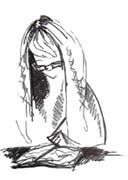[A] "people's history" promises more than any one person can fulfill, and it is the most difficult kind of history to recapture. I call it that anyway because, with all its limitations, it is a history disrespectful of governments and respectful of people's movements of resistance.
That makes it a biased account, one that leans in a certain direction. I am not troubled by that, because the mountain of history books under which we all stand leans so heavily in the other direction--so tremblingly respectful of states and statesmen and so disrespectful, by inattention, to people's movements--that we need some counterforce to avoid being crushed into submission.
All those histories of this country centered on the Founding Fathers and the Presidents weight oppressively on the capacity of the ordinary citizen to act. They suggest that in times of crisis we must look to someone to save us...And that between occasional crises everything is all right, and it is sufficient for us to be restored to that normal state. They teach us that the supreme act of citizenship is to choose among saviors, by going into a voting booth every four years to choose between two white and well-off Anglo-Saxon males of inoffensive personality and orthodox opinions.--p. 631
 I would expect a book of this caliber to be depressing. I would expect it to have the sort of impact that makes me feel suddenly awake, but uneasy in my new knowledge and slightly guilty, because now that I know I must act. I would expect to feel as though I should do something important, now, but I would not know what to do. I'd feel more alert to injustice, but helpless in the face of it, and so I would say Yes, it was a great book. But it was depressing.
I would expect a book of this caliber to be depressing. I would expect it to have the sort of impact that makes me feel suddenly awake, but uneasy in my new knowledge and slightly guilty, because now that I know I must act. I would expect to feel as though I should do something important, now, but I would not know what to do. I'd feel more alert to injustice, but helpless in the face of it, and so I would say Yes, it was a great book. But it was depressing.That is what I would expect from a book like this, A PEOPLE'S HISTORY OF THE UNITED STATES, but of course I'd be sorely wrong. Though Zinn approaches American history with a sharp eye for injustice and is sometimes brutally revealing, sometimes graphic, the startling facts that he presents throughout his telling of the people's resistance (to poverty, to slavery, to genocide, to oppression far worse than any US History class I took ever suggested) never once left me feeling helpless.
In fact, it had quite the opposite effect: Zinn's telling is motivating, as it highlights the instances in American history where the people rose up and defied a system designed to hold them in their place, a system run by "impartial" laws geared toward the rich and by a Constituation whose "We, The People" only applies to white, male property owners. Whether or not the rebellions always won what they fought for, Zinn cites them as examples of what can be achieved with unity, and of the fact that people can unify across class and race and gender lines. Really, this is a history of protest and of people's movements.
A PEOPLE'S HISTORY is written well, so that it's easy to pick up, to follow, and not weighted down by statistics or grandiose statements, and even though it's a whopping 687 pages, I think it's one that everybody (and I mean that: everybody) should read, because it shows that we are more influential than our politicians would have us believe, and that we, the people, have far more power than our leaders would like us to realize.
RATING: 5

No comments:
Post a Comment